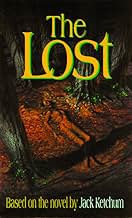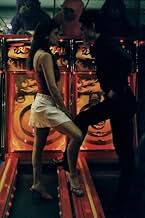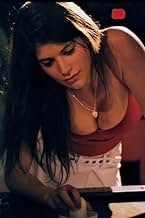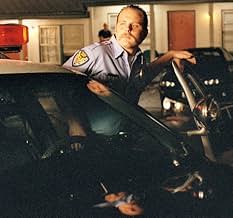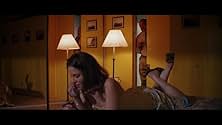Ajouter une intrigue dans votre langue19-year-old Ray Pye murders two young women. Four years later, detective Charlie Schilling knows that Ray did it. He just needs to prove it. Meanwhile, Ray has met his match in a new girl in... Tout lire19-year-old Ray Pye murders two young women. Four years later, detective Charlie Schilling knows that Ray did it. He just needs to prove it. Meanwhile, Ray has met his match in a new girl in town, Katherine Wallace.19-year-old Ray Pye murders two young women. Four years later, detective Charlie Schilling knows that Ray did it. He just needs to prove it. Meanwhile, Ray has met his match in a new girl in town, Katherine Wallace.
- Réalisation
- Scénario
- Casting principal
- Récompenses
- 2 victoires et 1 nomination au total
Dee Wallace
- Barbara Hanlon
- (as Dee Wallace-Stone)
Avis à la une
Jack Ketchum's novel, itself inspired by a true story, provides the basis for this chilling look at the actions of a young sociopath, not giving a damn about anybody or anything, and capable of chilling acts of violence. One day, he murders two young women, and his two friends, despite their misgivings about his character, cover up for him. Cut to four years later, and he's still walking around free. Detectives know he's guilty, but can't prove it. It's only a matter of time until the unhinged young man will explode again, and when he believes the people in his life, including his new girlfriend, are all betraying him or letting him down, the stage is set for a bloody revenge.
This works more like a series of episodes for a while, rather than an ongoing story, and is deliberately paced and character driven. Writer / co-producer / director Chris Sivertson sometimes goes for stylistic flourishes, but more often than not handles the material in a straightforward manner. It manages to be subtly spooky and only towards the end does it really get intense; this final act is shocking in its brutality. There's a bit of titillation (breast shots and full fledged nudity) and a respectable amount of gore at the end. As the movie goes on, one feels more and more uncomfortable in the presence of such a smarmy psycho. Actor Marc Senter is compelling in the lead role of Ray Pye, playing him with an effective mixture of uneasy charm and genuine creepiness. His co-stars Shay Astar, Alex Frost, Megan Henning, and Robin Sydney are also good in their own way, and some excellent veterans - Michael Bowen, Ed Lauter, and Dee Wallace - provide some wonderful support. Lauter has one of his best roles in a while, but it's disappointing to see Wallace's participation basically limited to one big scene. Ruby Larocca and always delectable Misty Mundae play the murder victims in the opening sequence.
One may wish that the ending weren't as abrupt as it is (there's no epilogue of any kind), but all in all "The Lost" is fairly potent stuff that doesn't leave the viewer unaffected. Ketchum really is a master at telling these grim and gut wrenching horror stories.
Seven out of 10.
This works more like a series of episodes for a while, rather than an ongoing story, and is deliberately paced and character driven. Writer / co-producer / director Chris Sivertson sometimes goes for stylistic flourishes, but more often than not handles the material in a straightforward manner. It manages to be subtly spooky and only towards the end does it really get intense; this final act is shocking in its brutality. There's a bit of titillation (breast shots and full fledged nudity) and a respectable amount of gore at the end. As the movie goes on, one feels more and more uncomfortable in the presence of such a smarmy psycho. Actor Marc Senter is compelling in the lead role of Ray Pye, playing him with an effective mixture of uneasy charm and genuine creepiness. His co-stars Shay Astar, Alex Frost, Megan Henning, and Robin Sydney are also good in their own way, and some excellent veterans - Michael Bowen, Ed Lauter, and Dee Wallace - provide some wonderful support. Lauter has one of his best roles in a while, but it's disappointing to see Wallace's participation basically limited to one big scene. Ruby Larocca and always delectable Misty Mundae play the murder victims in the opening sequence.
One may wish that the ending weren't as abrupt as it is (there's no epilogue of any kind), but all in all "The Lost" is fairly potent stuff that doesn't leave the viewer unaffected. Ketchum really is a master at telling these grim and gut wrenching horror stories.
Seven out of 10.
The Lost is a film that had a lot of potential, some great directing, a good cast, and a decent script. The problem is that it goes on forever.
The movie starts with a bang, and then kind of slows down, and the audience is given a group of characters to follow around. It is during this part of the film that all structure falls away, and things just kind of float. There is no real movement. Now, The Lost is based off of a novel, and the scenes in the novel probably had a bit more power because the reader can get into the character's head. It is much harder to do that in film, and because of that the importance of some of the scenes is unclear. Whole scenes could have been excised, and nothing would have been taken away from the story.
Then we get to the ending. I'm not going to say what happens, but I will say that it is very easy to see when things are starting to pick up and get back on track, and once they do, all bets are off. The ending of this film is one of the most disturbing and painful things I have ever watched in my life. The thing is, the audience knows that this is coming, but still, it is hard to brace yourself for the intense cruelty that you'll witness.
This is a film that gets an A for effort, but a C+ for execution. While the beginning and the end are tight, the middle of the film seems to lack direction and focus. Nothing happens, and very little is gained. So, this one is a rental.
The movie starts with a bang, and then kind of slows down, and the audience is given a group of characters to follow around. It is during this part of the film that all structure falls away, and things just kind of float. There is no real movement. Now, The Lost is based off of a novel, and the scenes in the novel probably had a bit more power because the reader can get into the character's head. It is much harder to do that in film, and because of that the importance of some of the scenes is unclear. Whole scenes could have been excised, and nothing would have been taken away from the story.
Then we get to the ending. I'm not going to say what happens, but I will say that it is very easy to see when things are starting to pick up and get back on track, and once they do, all bets are off. The ending of this film is one of the most disturbing and painful things I have ever watched in my life. The thing is, the audience knows that this is coming, but still, it is hard to brace yourself for the intense cruelty that you'll witness.
This is a film that gets an A for effort, but a C+ for execution. While the beginning and the end are tight, the middle of the film seems to lack direction and focus. Nothing happens, and very little is gained. So, this one is a rental.
Possible Spoilers!!-I attended a preview screening of "The Lost". Having read the book, as well as an account of the true story on which Jack Ketchum's tale is based, I had an idea of what to expect, however, I was unprepared for the integrity shown by the filmmakers in their unflinching look at narcissistic violence. The main character, Ray Pye (chillingly portrayed by Marc Senter) represents the childish nature of current American Pop Culture in which we have become so accustomed to instant gratification that, when we don't actually get what we want when we want it, the infant inside us can explode. And that indeed is the story of Ray Pye. "The Lost", for me, is a return to 1970's style film-making, ala "Taxi Driver" & "Straw Dogs". To call it simply a horror film is to sell it short. The writer/director Chris Sivertson has created a character driven story in which Pye's need for control is driven up a notch with the introduction of each new (independent) female character, women with their own problems, and so not as naive as the two "robots" Pye has controlled since high school. This loss of control, combined with the scrutiny of a dogged police detective, is what ultimately causes Pye's "makeup" to crack, if you will. What results is violent indeed, but shown with a realism much needed in this day and age of CGI "shock and awe" gore. And unlike some of the unnecessary cruelty depicted in movies like "Saw", scenes of torture shown seemingly for no other reason than to "top" the competition, the culmination of Pye's frustration has a very specific conclusion, and without trying to psychoanalyze too deeply, it is indeed symbolic that Pye's rage is infantile in nature. The ending of the film will cause many to gasp, but is in no way gratuitous. At any rate, it is not my intention to "review" the film, per se, although it is made with much technical skill and good knowledge of effective camera angles, dynamic sound effects and some very inventive "kinetic" editing sequences, giving the viewer an "adrenaline" rush, coming from fear, as if we are in the room with Pye and his victims. If you have read any of Ketchum's work (or are familiar with the true story of Charles Schmid) you will know going in that this film is no fairy tale. And yet, it is hoped by this film fanatic that "The Lost", BECAUSE of it's realism, and BECAUSE it depicts violence as it really is, neither glossed over nor unnecessarily gory, will find distribution to as many screens as possible, because believe it or not folks, there is an audience out there who remember the great independent filmmakers of the 1970s and have been wondering for a while when the next batch of Scorceses and Schraders were gonna come along. Coming from a totally original perspective, two of them are here now: Chris Sivertson and Lucky McKee. They have made an excellent character study here. With "The Lost", they have cast a steady gaze on the nature of violence, holding Ray Pye up in the mirror to show us the real reflection of what takes place when a culture of indulgence goes unchecked for too long. In this day and age of ho-hum mass murder and twenty-four hour turnaround "change the subject" news media, to make a film like "The Lost" takes courage and integrity. Sivertson and McKee have these qualities, as well as talent in spades. Let's give them the recognition they deserve!
I saw this film in the Sitges film festival. I like very much. It's a very realistic and visceral drama in the same style of David Cronenberg's a history of violence, Clint Eastwood Mystic River or Sam Peckinpah Strays dogs. The direction & the actors are amazing. The dramatic a violence scenes are excellent & the music that accompanies to them it's great & ideal. The edition of this film are amazing, totally moved away of the video-clip style. The photography is in the same quality of the edition of this movie. The character & the acting of Marc Senter is amazing ... it's in the same style of Christian Bale's Patrick Bateman. Great adaptation of the Jack Ketchum book & excellent American drama.
An okay indie thriller about the gradual meltdown of a psychotic teenager. It's a solid screenplay bolstered with some excellent performances, starting out with a dirty, gritty authenticity that's reminiscent of classic exploitation flicks of the past. But about halfway through, director Sivertson seems to be possessed by the muse of David Lynch. We have the bad-boy Greaser, the red-lipped femme fatale, the nighttime drives and seedy motel rooms, the graphic sex and violence, the contrast of raucous jazz with grating death metal. Unfortunately it lacks the all-important intellectual rabbit holes and surreal artistry. The tonal switcheroo is kind of distracting, and the second half drags terribly to an over-the-top WTF last act of shameless overacting. Sivertson clearly has talent, and he manages to convey a suitable sense of unhinged psychosis and disorientation. But he needs confidence in his own style and vision instead of cribbing from the playbooks of others.
Le saviez-vous
- AnecdotesBased on Charles Schmid Jr. murders, also known as Pied Piper of Tucson murders.
- Crédits fousMosquitoes can be heard buzzing when the final credits have rolled.
- ConnexionsFeatures La Nuit des morts-vivants (1968)
- Bandes originalesThe Pied Piper
Written by Artie Kornfeld (as Kornfeld) & Steve Duboff (as Duboff)
Performed by Crispian St. Peters
Courtesy of Repertoire Records
Meilleurs choix
Connectez-vous pour évaluer et suivre la liste de favoris afin de recevoir des recommandations personnalisées
- How long is The Lost?Alimenté par Alexa
Détails
Box-office
- Budget
- 1 000 000 $US (estimé)
Contribuer à cette page
Suggérer une modification ou ajouter du contenu manquant



